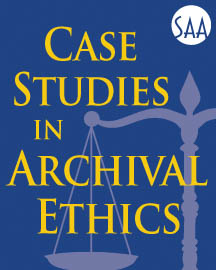- About Archives
- About SAA
- Careers
- Education
- Publications
- Advocacy
- Membership

The Society of American Archivists is publishing a series of case studies designed to facilitate an understanding of ethical issues in the management of archives and records. The case studies are to draw on the principles set forth in the current Code of Ethics for Archivists, developed by the Committee on Ethics and Professional Conduct (CEPC) and approved by the SAA Council in January 2012. Case studies will be peer reviewed using a single-blind process. They will be published electronically and distributed through the SAA website under a Creative Commons license, with copyright retained by the authors. Suggested use for these case studies includes as teaching tools in graduate archival education programs and in continuing education workshops, as well as generally by archivists to stimulate dialogue and thought.
CEPC invites individuals to submit case studies drawn from real life. Case studies should address one or more of the areas covered by the Code of Ethics. Sections of the Code include (1) professional judgment in carrying out basic archival tasks, (2) protecting records authenticity, (3) access to and use of records, (4) professional relationships with donors or users, (5) privacy issues, (6) ensuring security against theft, and (7) questions of trust in archivists’ conduct. The goal is to develop a series of case studies that address each aspect of the code and that are based on actual situations.
CEPC encourages case studies that address emerging ethical issues in which current societal, legal, judicial, and/or technological developments are involved. Archivists are increasingly confronted with challenges regarding digital rights management, electronic records preservation, and social media, to name just a few examples. As the archival world shifts, case studies are potentially helpful tools to deal with the wide range of changes experienced by both seasoned veterans and new professionals.
Case writers may present examples of ethical problems drawn from their direct experience or as a result of indirect knowledge. Alternatively, they may choose to write about an ethical issue in the news. In any instance, case studies will depend on background research, which may include interviews with key players in the situation. The successful case study will present the problems in ways that explore and analyze a situation but without pointing the reader in the direction of a particular solution or set of solutions.
If you have an idea for a case study and would like feedback prior to writing it, feel free to contact CEPC Chair Tiffany Schureman at tlschureman@vcu.edu. It is not necessary, nor does it guarantee publication, to contact Ms. Schureman prior to writing a case study. Rather, it is an option if you would like to discuss an idea and receive informal input before you begin writing.
To submit a case study, please use the SUBMISSION FORM. Include all of the required information—such as institutional identity, authorship, and case summary—in the order that it is requested. Suggested case study length is 2,500 to 5,000 words. Authors are responsible for understanding and following the principles that govern the “fair use” of quotations and illustrations and for obtaining written permission to publish, where necessary. Accuracy in citations is also the author’s responsibility.
All submissions will be reviewed by two members of CEPC and evaluated according to a RUBRIC. The reviewers will return the case study and completed rubric within three weeks of receipt to the Chair of CEPC, who will then review the feedback and make a publication recommendation to SAA’s Publications Editor. Within five weeks after submission, the case study author will be notified of the publication decision.
A submission will not be considered if is being reviewed by another publishing outlet at the same time, nor if it has been published previously in a similar form.
Once accepted, case studies will be submitted to the SAA Publications Editor and Director of Publishing for light copyediting. If major changes are needed, a version tracking those changes will be sent to the author for confirmation. After the author signs off on a final version, SAA will format the case study and post it to the website as a PDF.
Copyright of the case study will remain with the author, and SAA will acknowledge this in the copyright line that appears with the case study. Authors will consent, grant, and assign to SAA the non-exclusive right to publish and/or distribute all or any part of the case study throughout the world in electronic or any other medium. In return, SAA agrees to publish the work under a Creative Commons Attribution No Derivatives license.
An Online Exhibit: A Tale of Triumph and Tribulation
by Nancy Freeman, CA and Robert B. Riter
FOIA Request
by Nancy Freeman, CA and Holly Geist, CA